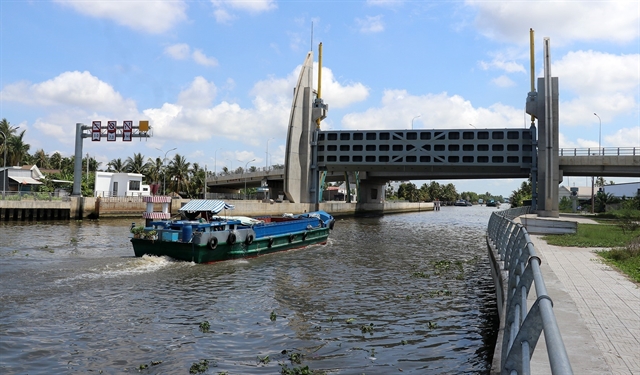 Environment
Environment

 |
| Vàm Bà Lịch irrigation work in the Mekong Delta province of An Giang.—VNA/VNS Photo Lê Huy Hải |
HÀ NỘI — Chairpersons of provincial People's Committees have been authorised to appraise environmental impact assessment reports and issue environmental permits for investment projects previously under the jurisdiction of the Ministry of Agriculture and Environment as of July 1.
The decentralisation of duties is as prescribed in Clause 1, Article 35 of the Law on Environmental Protection.
The change does not apply to the following cases:
* Investment projects approved by the National Assembly or the Prime Minister, except for projects located across two or more provinces and already assigned to a single provincial People’s Committee as the relevant authority under regulations governing public-private partnerships or public investment law.
* Projects under the jurisdiction of the ministry relating to licences for mineral exploitation, water resource usage, marine dumping or allocation of maritime zones.
* Infrastructure development and business projects within designated industrial, commercial or service zones.
* Projects involving large-scale land or water surface use (excluding hydropower plants or agricultural projects focused solely on annual/perennial crops or plant propagation).
* Projects located within industrial zones or clusters which involve hazardous waste treatment services, use of imported scrap materials as production inputs or expansion of operational facilities exempt from wastewater connection but still subject to environmental monitoring.
* Projects located outside of industrial zones or clusters but categorised as high-pollution risk with large-scale capacity as outlined in Column 3, Appendix II of Decree 08/2022/NĐ-CP, as amended by Decree 05/2025/NĐ-CP (excluding livestock farming or abattoir businesses).
Some other responsibilities and powers of the Prime Minister and the Minister of Agriculture and Environment in the environmental sector will be delegated to provincial-level authorities starting this month.
These include the development and issuance of plans for the treatment, remediation and restoration of severely contaminated land, especially in cases where pollution sources are historical or unidentifiable.
Additionally, the provincial People’s Committees will be responsible for managing dredged sludge from local canals, ditches and irrigation structures, ensuring compliance with environmental protection standards.
They will also set economic and technical norms for the collection, transport and treatment of municipal solid waste within their jurisdiction.
The decentralisation aims to improve administrative efficiency, expedite procedures and tailor environmental governance to local conditions.
These responsibilities must be implemented following the procedures outlined in Article 34 of the Law on Environmental Protection.— VNS